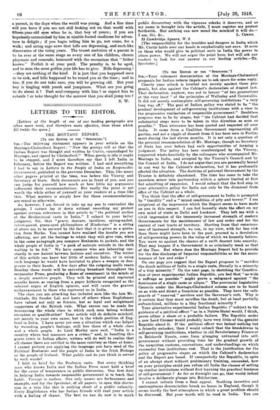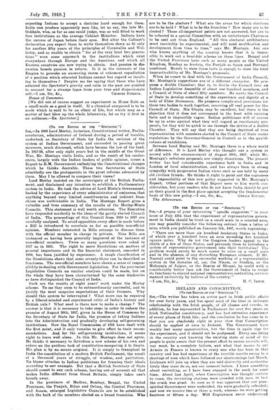[To rhz TIADTTOR OF THE "-SPECTATOR.")
Sia,—Your vehement denunciation of 'the Montagu-Chelmsford proposals for Indian reform impels me to ask apace for some reply.
Clearly your attack is levelled not merely against these pro- posals, but also against the Cabinet's declaration of August last. That declaration, anyhow, was not in favour "of two generations at the very least " of the principles of -Wellesley and Cornwallis. It did not merely contemplate self-governing institutions " a very long way off." The goal of Indian policy was stated to be " the gradual development of self-governing institutions with a view to the progressive realization of responsible government." Doubtless progress was to be by stages, but " the Cabinet had decided that substantial steps were to be taken in this direction as soon as possible." That utterance has been quoted and requoted all over India. It came from a Coalition Government representing all parties, and not a ripple of dissent from it has been seen in Parlia- ment -during the last eleven months. It is not only a question of the personal recommendation of Mr. Montagu, though no Secretary of State has ever before had such opportunities of forming a judgment. The policy has been countersigned by the Viceroy, supported whole-heartedly by the colleagues who 'accompanied Mr. Montagu to India, and accepted by the Viceroy's Council and by the Council of India. I do not argue that you are personally bound in any way by the Cabinet's declaration, but it has profoundly affected the situation. The doctrine of paternal Government by the Trustee is definitely abandoned. The time has come to take the quondam minor into partnership within a sphere limited at first but admitting of expansion. I would submit that the first step in your alternative policy for India can only be the dismissal from office of the Cabinet as a whole.
You think that the offer of self-government to India is prompted by "timidity" and a "mixed condition of pity andlerror." I am surprised at the impression which the Report seems to have made on you in this respect. I can but honestly state the effect on my own mind of visits to Delhi and Luck-now. They left me with a vivid impression of the immensely increased strength of modern Governments for the maintenance of law and order .and for the control of vast tracts of territory. Starting from that conscious- ness of increased strength, we can, in my view, with far less risk than there might have been in the past, proceed to a devolution of self-governing powers In the 'value of which we honestly believe. You warn us against the chance of a swift descent into anarchy. That may happen if a Government is as criminally weak as that of the Tear. But where does the Montagu Report fail to provide for the due discharge of Imperial responsibilities or for the main- tenance of law and order P On one page you suggest that the Report proposes to " sacrifice the dumb millions of India to a single caste, literally to a minority of a tiny minority." On 'the next page, in sketching thi Constitu- tion of -your experimental Indian Republic, you feel -that " as -wide a suffrage as possible " might prove a safeguard against " the dominance of a single caste or clique." The provincial Legislative Councils under the Montagu-Chelmsford scheme are to be based on as wide and direct a franchise as possible. They have the safe- guards of " reserved " services and the Governor's vetb. Why is it certain that they must sacrifice the dumb, but at least partially enfranchised, millions to a tiny fractional minority ?
Your alternative experimental Indian Republic ("subject to the guidance of a political officer " as in a Native State) would, I think, prove either a sham or a probable failure. The Republic under a new Lord Cromer would probably have very little of the kennine Republic about it. If the political officer was indeed nothing but a friendly onlooker, 'then I would submit that the breakdowns in self-governing institutions, whether in old Revolutionary France or in Bolshevik Russia, come from plunging untrained into self- government without providing time for the _gradual growth of the unwritten customs, conventions, and understandings on which successful free institutions rest. That is the justification for the policy of progressive stages on which the Cabinet's declaration and the Report are based. If unexpectedly the Republic, in spite of an abrupt start without preliminary training, succeeded, how on your principles could you refuse all India the chance of setting up similar institutions without first learning the practical business of self-government ? As far as foresight can go, that would indeed involve a deliberate plunge into Bolshevism.
I cannot refrain from a final appeal. Scathing invective and contemptuous denunciation break no bones in England, though it seems hardly the best atmosphere in which a great problem should be discussed. But your words will be read in India. You are expecting Indians to accept a doctrine hard enough for them. India can produce apparently men like, let -us say, the late Mr. Gokhale, who, as •far as one could judge, was as well fitted to work free institutions as the average Cabinet Minister. Indians have the success of Japan before their eyes. But after the Cabinet's declaration you expect them to write themselves down as fit only for another fifty years of the principles of Cornwallis and Wel- lesley, and as unable to obtain " for at the very least two genera- tions " even some approach to the institutions which exist everywhere through Europe and the Americas, and which all Eastern countries are now trying to obtain. And passion in dis- cussion breeds passion in return. Is it in the interests of the Empire to provoke an answering storm of vehement repudiation of a position which educated Indians cannot but regard as insult- ing to themselves ? Forgive me for saying that those who have admired the Spectator's gravity and calm in the past are puzzled to account for a strange lapse from your true and dispassionate
[We did not of course suggest an experiment in Home Rule on a small scale as a. good in itself. If a chemical compound is to be made which is said to be an elixir of life, but which may as a matter of fact blow up the whole laboratory, let us try it first in an outhouse.—En. Spectator.]



























 Previous page
Previous page